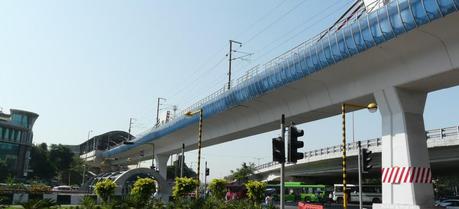 A metro line crossing the Inner Ring Road at Moolchand metro station in Dehli, India. (Credit: Flickr @ Varun Shiv Kapur http://www.flickr.com/photos/varunshiv/)
A metro line crossing the Inner Ring Road at Moolchand metro station in Dehli, India. (Credit: Flickr @ Varun Shiv Kapur http://www.flickr.com/photos/varunshiv/)The Delhi Metro Rail Corporation (DMRC) and the Solar Energy Corporation of India (SECI) signed a Memorandum of Understanding (MoU) in order to carry out projects for the production of renewable solar energy in the Delhi Metro premises.
As per the MoU, both the organizations will collaborate for the development of solar PV projects (ground mounted, rooftop and other possible modes) at identified DMRC sites for the production of solar energy.
After signing of this MoU, a pilot project of 500 kW (peak power) rooftop grid connected solar PV project will be installed at one of the identified rooftops of the Delhi Metro Stations. The two organizations will also explore the possibility of developing of another sites where solar PV plants can be set up.
In order to carry out these projects, DMRC and SECI will constitute a Joint Development Team (JDT) which will consist of senior officials from both the organizations.
Earlier, the German Society for International Cooperation (Deutsche Gesellschaft für Internationale Zusammenarbeit GmbH), a federal enterprise of the Government of Germany, actively supported DMRC’s solar initiative under its COMSOLAR programmer meant to facilitate International cooperation for sustainable development.
The production of solar power through this MOU will help DMRC partially fulfill its energy requirements as well as reduce carbon footprint. Solar Energy Corporation of India (SECI) is a not-for-profit company under the Ministry of New and Renewable Energy, Government of India, with the objective of developing solar technologies and solar power plants in India.
Delhi Metro has already taken up a slew of measures oriented towards the conservation of environment and the use of renewable means of energy. In 2011, DMRC was certified by the United Nations (UN) as the first Metro Rail and Rail based system in the world to get carbon credits for reducing greenhouse gas emissions as it has helped to reduce pollution levels in the city by 6.3·105 tons every year thus helping to reduce global warming.
DMRC’s first CDM project on regenerative braking had also achieved many international firsts apart from earning valuable foreign exchange for the country.

